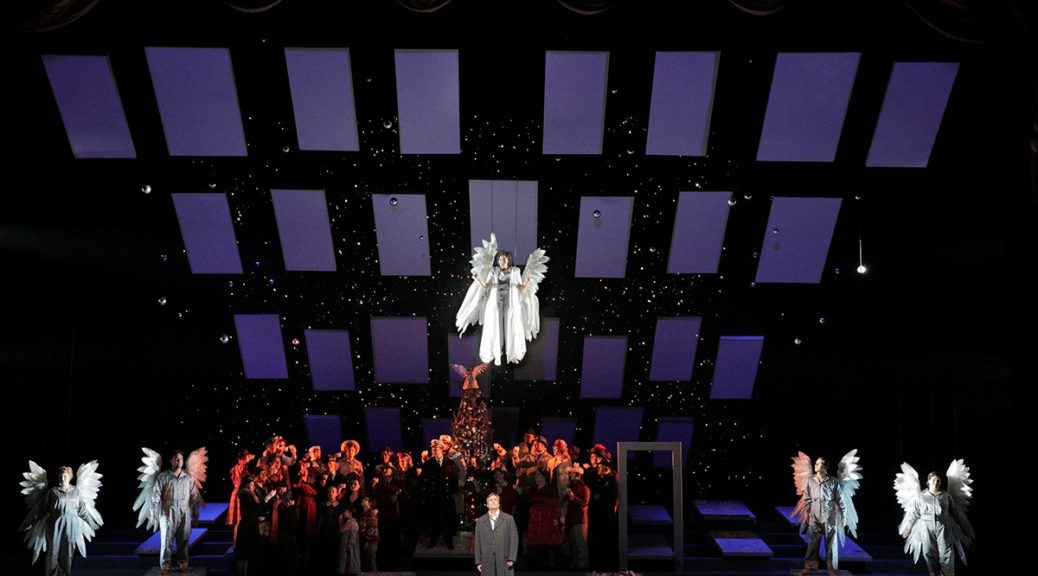
EVERYMAN AS HERO IN OPERA
The prolific composer Jake Heggie, 57, has amiable music coursing through his veins, resulting in some 300 songs written to date.
You may recall Schubert in Vienna, and Brahms in Pörtschach, with so many melodies in the air, all they had to do was write them down. Or so was the claim. And Heggie gets his lyrical inspiration right here in San Francisco.
But that make-no-waves facet of his does not transfer readily to composing operas with action, drama, and keen characterization. His recently revised “It’s a Wonderful Life” 2016 playing at the San Francisco Opera fails to connect closely to his characters as they live the American middle-class fairy-tale dream, where their “crises” involve weighty family concerns—losing a check, running up debts, and having to defer college admission—but not the essentials to dramatize opera. An array of flying choral angels—absent in the original 1946 movie—add fantasy to a libretto excessively mired down in bankers’ talk of debts, payoffs and mortgage loans. Dollars and cents alas are not what musical theater is made of.
Even in this interesting hybrid form that we could call opera/musical, the small-town characters out of 1930 do not ring true. We should care deeply that the hero, a hard-working banker named George, is ruined and about to plunge to a suicide death. We should be relieved that his guardian angel Clara (soprano Golda Schultz) prevents it, as she leads him through a mystical and intriguing alternate universe to reflect on his true earthly assets before returning to the real world.
Quite apart from that memorable angelic/mysticism scene, the make-believe in this sweet Main Street family story of likable/agreeable people is considerable, especially as several plunges into the “waters” are called for. Some 32 solo singers are required, but at least the size of orchestra is modest. What does work very well is the quartet of angels in chorus keeping watch over George and Clara, plus the large chorus of townspeople often more critical than supportive of the selfless George.
In the end this opera/musical of Heggie and librettist Gene Sheer is a sweet and sentimental story suitable for all audiences, ending with a robust (but dubiously derivative) borrowing of “Auld Lang Syne” for the final curtain, when George has won the support of his town, and the angel second-class Clara has finally earned her celestial wings.
The unmistakably operatic voice in all this is Mary (the lustrous Canadian soprano Andriana Churchman), alongside the far bigger role of the husband George (tenor William Burden). The wooden financial villain (veteran baritone Rod Gilfry) working to destroy George was straight out of melodrama—remember the 19th-century plays of the mustachioed villain foreclosing on the impoverished widow, waving the deed in her face while she dissolved in tears?
The upbeat production presented Nov. 17-Dec. 9 featured a cluttered set tailor-made for the barking shins of the mobile singer/dancers; nonetheless it’s bursting with color (designers Robert Brill and Brian Nason). Patrick Summers, a regular with the Heggie-Sheer team, conducted the spirited orchestra. Leonard Foglia directed effectively.
Unlike many other composers these days, the energetic Heggie is never reluctant to revise his opus. After the adaptation from the movie script, and the recasting of the guardian angel, more revisions were made for the musical work’s third and latest venue here in California.
But the life of this piece remains less than wonderful.
“IT’S A WONDERFUL LIFE,” an opera/musical by Jake Heggie, at S.F. Opera. For SFO info: (415) 864-3330, or go online.